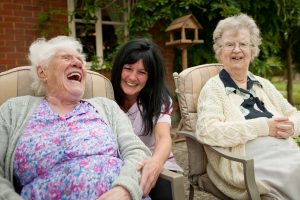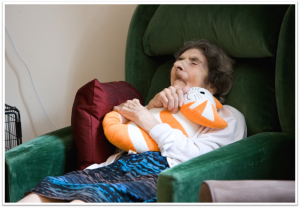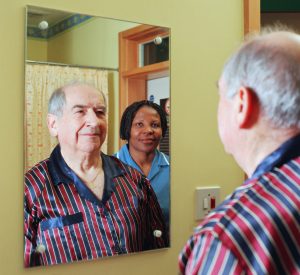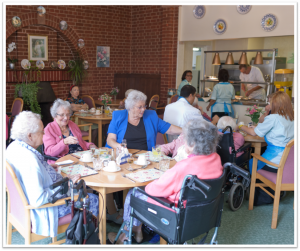Our 6-part Thriving in Residential Care Series & Webinar with Care England
 We’ve collaborated with Care England on a series of 6 articles and webinar spotlighting the powerful stories we uncovered in our ‘Thriving in Residential Care’ research.
We’ve collaborated with Care England on a series of 6 articles and webinar spotlighting the powerful stories we uncovered in our ‘Thriving in Residential Care’ research.
Our study was the UK’s largest qualitative research study on older people’s experiences of living in care homes, funded by Hallmark Foundation.
We found 6 key ways that care homes are transforming lives and supporting many older people to really thrive.
Hear real stories from older people, families and care teams!
Read the 6 articles

Our Week 1 theme ‘Thrive Relationally’ explores how care homes can be “a lifeline for isolation”, including for Brian, Kathy, Tom, and Rosemary, who have all formed meaningful friendships with other adults and with care team members since they moved into residential care.
We also hear the great efforts of care teams to support people to adjust as they transition into living in a care home, and how the move to residential care can help restore and enhance family relationships.
Read the full blog
Week 2 spotlights how meaningful care home activity is integral to supporting physical, mental and social wellbeing.
Irene, aged 82, lives in a care home. She previously had a long career with a fabric company, working until she was 78! Working with textiles is a critical part of her identity. Unable to sew anymore “because of my hands”, Irene is now knitting scarves for the staff at her care home. So far she has done 13!
She has also found renewed purpose in setting the tables at mealtimes and helping the home’s gardener to plant flowers. Irene is a fantastic example of someone ‘Thriving Actively’ in residential care.
Read the full blog
“We have made an environment where somebody feels so safe that, at age 82, he’s been able to come out [as gay]. I thought “my job is done”. If this environment is safe enough that somebody feels that they can do that, this environment is correct.” – Jay, Care Manager
Some of the most powerful stories in our ‘Thriving in Residential Care’ research, are those of older people being supported to embrace their faith, culture, ethnicity, sexuality and gender identity, whilst living in a care home.
In week 3 we explore how older people are ‘Thriving Inclusively’ in residential care; able to be their full selves.
Read the full blog
‘Feeling safe and secure’ is one of the greatest benefits of living in a care home – according to older people, families and care teams across the UK.
Care homes offer older people reassurance, a sense of safety and alleviate worry, like for 94-year-old Harriet. Living by herself, Harriet was becoming increasingly frail, “getting scared all the time”, including at night, and had fallen on several occasions. After moving to her care home, she “felt really safe”.
Other older people were experiencing poor housing, insecurity and even violence. 75-year-old Pauline previously lived with her daughter and son-in-law, who “was a drinker” and “used to throw bottles and all that”. Now living in a care home, Pauline is finally being treated with kindness and respect; “I was glad that I come out of there and that I’m in here now. Everything’s got better for me.”
Read the full blog
‘Thrive with Dignity’ is the penultimate blog in our series.
Before moving to a care home, many older people we spoke to found it increasing difficult to keep on top of household chores, such as laundry, as well as attending to their personal care needs.
Once living in residential care, older people received much-valued support with their personal hygiene, and with other elements of daily living.
Maureen, aged 90, said “Now I don’t have to worry about my washing, whether I’ve got heat or anything”, meanwhile 94-year-old Angela laughed when she told us, “that’s my best friend – the toilet!”
Read the full blog
Our final theme is ‘Thrive Healthily’. Thanks to care teams providing proactive and pre-emptive health support, managing medications, recognising changes and responding quickly, many older people felt that their health had actually improved since moving into a care home.
This was true for a lady who arrived from hospital with a “grade five pressure sore”, wasn’t eating or drinking and had a very poor life-expectancy prognosis. But with the right support, the pressure sore healed and she also began eating well again, with care team member Caitlin saying, “she’s amazing, she’s thriving – she’s not going anywhere.”
Older people also really valued having regular mealtimes and good quality food, like 98-year-old Suzanne, who was previously “lacking good food”, struggled with making a cup of tea and “lived for a fortnight on brown bread, Marmite and oranges”.
Read the full blogJoin us for a Webinar!
On Wednesday 16th April we’re holding a 1 hour webinar with Care England.
We’ll be sharing how our research is being used by care homes and commissioners of services, to evidence and assess quality, and make a real difference to practice.
Sign up here
Workshops for Care Leaders
We’ve designed a series of workshops building on this research to capture what matters to older people living in care homes.
The facilitated workshops are designed to support care leaders through a journey from self-care to quality improvement, connecting to key messages from the research and aligning with the CQC ‘Well-led’, ‘Responsiveness’ and ‘Effectiveness’ quality statements.
For more information, please contact us:
Contact us

